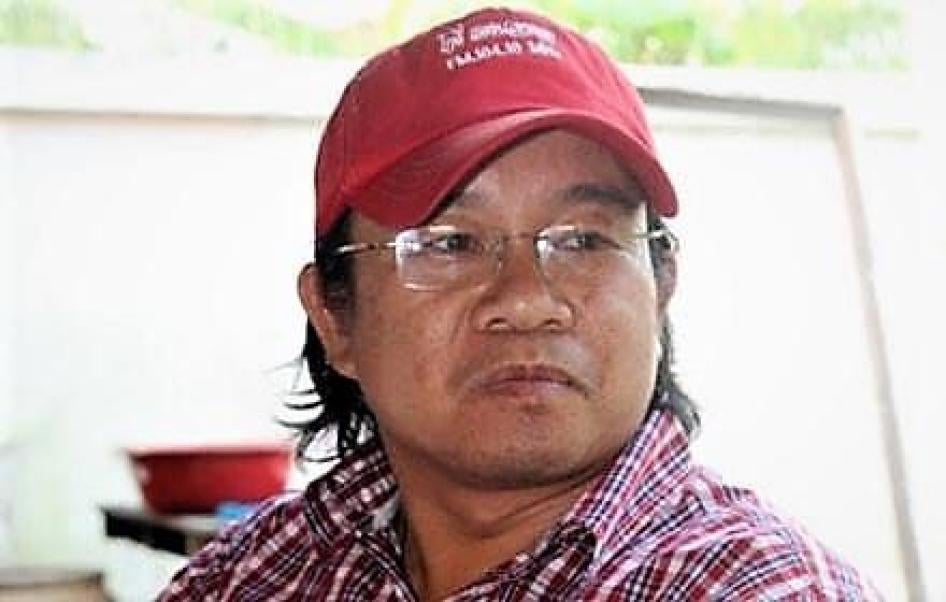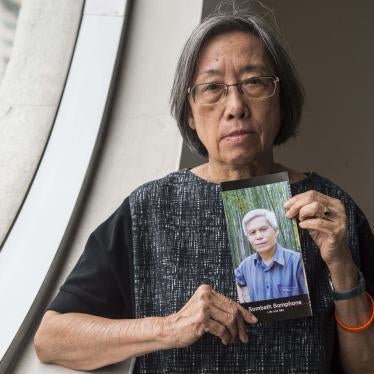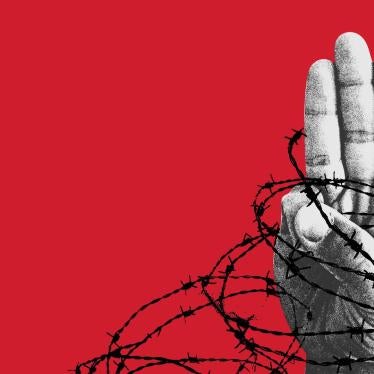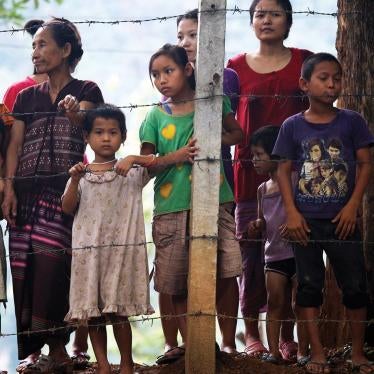(New York) – The Lao authorities should urgently investigate the abduction of an exiled Thai activist Wuthipong Kachathamakul, also known as Ko Tee, Human Rights Watch said today. Eyewitnesses stated that a group of unknown armed assailants abducted him in Vientiane on July 29, 2017, raising grave concerns for his safety.
On July 29, at approximately 9:45 p.m., a group of 10 armed men dressed in black and wearing black balaclavas assaulted Wuthipong, his wife, and a friend as they were about to enter Wuthipong’s house in Vientiane according to multiple witnesses interviewed by Human Rights Watch. The assailants hit them, shocked them with stun guns, tied their hands with plastic handcuffs, covered their eyes, and gagged their mouths. Wuthipong was then put in a car and driven away to an unknown location while his wife and his friend were left at the scene. According to Wuthipong’s wife and his friend, the assailants were speaking among themselves in Thai. The incident was reported to Lao authorities in Vientiane.
“Wuthipong’s shocking abduction by armed men in Vientiane needs to be fully investigated; it should not be treated with silence or swept under the rug,” said Brad Adams, Asia director. “The Lao government needs to move quickly to ascertain the facts and publicly report their findings, including an assessment of Wuthipong’s whereabouts and who might be responsible for this crime that was so boldly carried out in its own capital city.”
Lao authorities should mount a serious effort to find Wuthipong if he is still in Laos, and take immediate steps to prosecute any persons in Laos who were involved in this abduction.
The Lao government should also permit the office of the United Nations High Commission for Refugees (UNHCR) to open an office in Vientiane to provide protection for persons fleeing political persecution in Thailand and other countries.
In media interviews on July 31, 2017, Thailand’s Deputy Prime Minister Gen. Prawit Wongsuwan and the army chief Gen. Chalermchai Sitthisart denied knowledge of Wuthipong’s abduction and said they have not received any official reports from Lao authorities yet.
Wuthipong operated a community radio network affiliated with the red-shirted United Front for Democracy against Dictatorship (UDD) in Thailand’s Pathum Thani province. His programs were known for having a strong anti-monarchy stance. Thai authorities have repeatedly accused him of using his radio program to call for the use of violence, and playing an instrumental role in several violent clashes with the royalist People's Democratic Reform Committee (PDRC). After the National Council for Peace and Order (NCPO) staged a coup and took power in the May 2014, he fled to Laos to escape lese majeste (insulting monarchy) charges. The Thai government also accused him of involvement with anti-government militia groups and plotting to assassinate Prime Minister Gen. Prayut Chan-ocha and other members of the NCPO junta. The Thai government lists Wuthipong as one of the most wanted of the exiled activists that Thai authorities have repeatedly requested the Lao government to arrest and extradite to Thailand. While in exile in Laos, Wuthipong continued to broadcast online radio programs in which he strongly criticized both military rule in Thailand and the Thai monarchy.
Since taking office in April 2016, the new Lao government of Prime Minister Thongloun Sisoulith has repeatedly failed to adequately respond to the country’s serious human rights problems. Lao authorities have routinely disregarded concerns raised by human rights groups. In June 2016, Itthipol Sukpaen, an exiled Thai activist who broadcasted anti-monarchy radio programs, vanished in Vientiane. The Lao government failed to conduct a serious investigation.
Laos has signed, but not ratified, the International Convention for the Protection of all Persons from Enforced Disappearance. Under international law, an enforced disappearance occurs when a person is detained by persons acting on behalf of the state, followed by a refusal of the state to acknowledge their detention or whereabouts, with the intention of placing them outside the law. Despite its obligation to conduct a transparent, thorough, and impartial investigation into all cases of alleged enforced disappearances, to resolve them, and bring those responsible to justice, the Lao government has failed to make progress on at least 10 cases of enforced disappearance, including the case of prominent civil society activist Sombath Somphone—who was last seen being taken away from a police checkpoint in Vientiane on December 15, 2012.
“The Lao government has a responsibility to find out what happened to Wuthipong and identify all those responsible, regardless of the political consequences,” Adams said. “Foreign donor organizations and governments with relationships with the Lao government should speak up now to press Vientiane to answer what happened to Wuthipong.”








